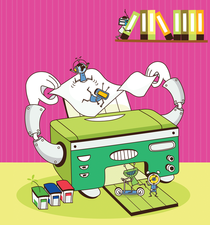Audex, the lean audio CD ripper
Rip, Rip, Hurray

With the Audex CD ripper, you can start digitizing your personal music collection immediately.
Linux has long established itself as a multimedia platform. The resulting wealth of applications makes it difficult to find the right program, especially for the casual user. If you want to rip audio CDs for your private party, your options at first glance are heavyweights like K3b, Rhythmbox, or Amarok, which all require significant familiarization time – or you can get started within 30 seconds with the compact audio ripper Audex [1] .
Installation
Audex is found in the software repositories of the major distributions; you can install it with a couple of mouse clicks using your distribution's graphical package manager. Depending on the distribution, you will then find an appropriate starter in the Multimedia or Entertainment submenu. The software quickly opens a self-explanatory program window in which – initially – no active controls appear, except for the menubar.
After you insert an audio CD, Audex reads its content and displays the titles in a list view on the right side of the application window (Figure 1). If you have an Internet connection, it automatically downloads the metadata, such as the cover, title, year, and genre, from the Freedb.org servers. If the ripper finds several CDs with the same title in the Freedb.org database, you can select the correct medium in the next dialog.
[...]
Buy this article as PDF
(incl. VAT)
Buy Linux Magazine
Subscribe to our Linux Newsletters
Find Linux and Open Source Jobs
Subscribe to our ADMIN Newsletters
Support Our Work
Linux Magazine content is made possible with support from readers like you. Please consider contributing when you’ve found an article to be beneficial.

News
-
EU Sovereign Tech Fund Gains Traction
OpenForum Europe recently released a report regarding a sovereign tech fund with backing from several significant entities.
-
FreeBSD Promises a Full Desktop Installer
FreeBSD has lacked an option to include a full desktop environment during installation.
-
Linux Hits an Important Milestone
If you pay attention to the news in the Linux-sphere, you've probably heard that the open source operating system recently crashed through a ceiling no one thought possible.
-
Plasma Bigscreen Returns
A developer discovered that the Plasma Bigscreen feature had been sitting untouched, so he decided to do something about it.
-
CachyOS Now Lets Users Choose Their Shell
Imagine getting the opportunity to select which shell you want during the installation of your favorite Linux distribution. That's now a thing.
-
Wayland 1.24 Released with Fixes and New Features
Wayland continues to move forward, while X11 slowly vanishes into the shadows, and the latest release includes plenty of improvements.
-
Bugs Found in sudo
Two critical flaws allow users to gain access to root privileges.
-
Fedora Continues 32-Bit Support
In a move that should come as a relief to some portions of the Linux community, Fedora will continue supporting 32-bit architecture.
-
Linux Kernel 6.17 Drops bcachefs
After a clash over some late fixes and disagreements between bcachefs's lead developer and Linus Torvalds, bachefs is out.
-
ONLYOFFICE v9 Embraces AI
Like nearly all office suites on the market (except LibreOffice), ONLYOFFICE has decided to go the AI route.

